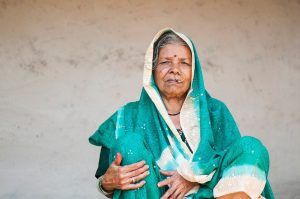People of Bharat: Gayatri, Delhi

Gayatri, 50, has been working as a cleaner at a women’s paying-guest accommodation in Delhi. A short, rotund body belies an appearance of prosperity. She shows me a sari that she received from another resident. ‘It is a little faded, but isn’t that in fashion nowadays?’ she asks sarcastically. I merely nod, noticing the smile that does not reach her eyes. As she hangs around my door, I draw up a plastic chair and she sits down on it. When I ask her for an interview, she bursts into a hearty laugh- ‘Main toh bilkul angutha chhap hun, mujhse kya puchhoge?’ (I am completely illiterate; what could you possibly ask me?)
Gayatri, her husband and three children live in a single room apartment in an urban slum in the north of Delhi. Gayatri hails from the town of Ghaziabad in Uttar Pradesh; her father was an auto rickshaw driver and her mother was a coal worker. Born into poverty and the oldest among her siblings, she had a role to play in the family income early on. She tells me about one of her family’s ventures- frame making and hook manufacturing. While the males in her home did the woodwork that went into making the frames, Gayatri made the hooks that were attached to the frame. She describes how her nimble fingers would expertly fashion hooks out of metal wire in a matter of seconds. ‘I liked it at first, but got bored soon. It was very monotonous.’ She found making cow dung cakes for cooking fuel more enjoyable. Gayatri tells me she was forced to drop out of school; pushed into looking after her siblings early on. ‘My youngest brother was still at my mother’s breast when I got married. He doesn’t remember much about my wedding.’
Gayatri was married into a joint family in an urban slum in Delhi that comprised of her mother-in-law, brother-in-law and her husband. Over time the family expanded to include her three children, her brother-in-law’s wife and their two children. She recalls that everything in her married life was idyllic at first. Her mother-in-law held a government job in a local hospital (as a cleaning staff) and earned a decent and steady salary. Gayatri stayed at home looking after the household. At first, Gayatri did not see anything amiss but the problems soon surfaced. Gayatri’s mother-in-law was a matriarch who indulged her sons; giving them Rs. 20 every week to spend it as they liked. Her brother-in-law and husband played cards with other men from the slums and soon gambled away their savings. Her husband became addicted to gambling and alcohol; and stopped contributing towards the household expenses. When Gayatri complained to her mother-in-law, she was advised to put up with it.
Tired of being emotionally abused, Gayatri left home with her one-year-old daughter and returned to her parents’ house in Ghaziabad. Gayatri had hardly spent a couple of hours when her brother-in-law showed up at the door late in the night, asking her to return as her mother-in-law had fallen ill. Gayatri felt pity for her mother-in-law and went back the next morning just to find out that it was all a lie staged to bring her back. The quarrels continued after a brief lull. ‘Ghar me bahot kalesh tha,’ (There were a lot of bitter brawls and bickering in the house) says Gayatri. She recalls most of the fights were over her mother-in-law’s money and discontent over how much she gave each of them for expenses.
I ask Gayatri about her children; she tells me she has a boy and two girls. Even though her first-born is a girl, she mentions her son first — a response typical of one cultured in a patriarchal society. Since she herself was uneducated, she vowed to send her kids to school; they all went to a sarkaari (government) school nearby. However, they all dropped out at varying levels of education. None of them attended college. Her oldest daughter got married two years back, she is in search for a suitable alliance for her younger daughter. ‘What does your husband do?’ I ask her gently. Her eyes flood with tears and she goes mum for a moment, wiping her eyes with the edge of her saree. ‘He finds work now and then, but doesn’t have a stable income. He drinks a lot, and spends whatever he earns on “daaru aur juaa” (alcohol and cards).’
A couple of years ago, Gayatri’s mother-in-law retired. Her pension helped them tide over rough times. Gayatri admits that life in Delhi (by her own standards) was quite comfortable up until a year ago, while her mother-in-law was still alive. She suddenly passed away a few months ago. Since then, the family’s finances have been under enormous strain. Then one day, Gayatri opened her cupboard to find Rs. 10,000 missing. Nobody in the house owned up to it. That is when she decided that she had to work and get in control of her finances. She found work as a housemaid/cleaner in various paying guest accommodations, similar to the one she works for currently.
Gayatri makes about Rs. 7000 per month and spends roughly Rs. 3400 on bills, Rs. 3000 on groceries and Rs. 600 on transportation. I ask her how is she able to manage her expenses. ‘I don’t spend much on food. I go to the government ration store to get grains, oil and sugar. My children don’t go to school anymore, so I don’t spend on education.’ She does not buy any insurance and lives in constant dread of the day when one of them falls sick. She has no savings, no investment. Gayatri owns some gold, worth Rs. 30,000, which she is saving up for her younger daughter’s wedding. I ask her if she has borrowed any loans. ‘I took a loan of 1.5 lakh from the bank two years ago. I had to pledge all of my gold. I’ve also borrowed a lot from my relatives. They have been kind.’ Gayatri tells me she took the loan for her younger daughter’s wedding. Unfortunately, the wedding didn’t take place. Her eyes well up again. ‘We have been looking for a boy for two years. But nobody wants to marry their son to my daughter. My son does not work and does not have a degree. My husband is jobless and an alcoholic. It will be difficult to find a groom.’
Gayatri likes her current job. She lives around three kilometres away, and so is able to walk to work. But sometimes if it is too hot, or if her knees ache too much, she spends Rs 20 (one way) on an electric rickshaw. Gayatri tells me she feels guilty spending for her own comfort. Yet I sense her pride when she relates how despite all odds, she managed to buy a second-hand smartphone for her daughter.
I ask her about her son. ‘He is twenty-six. Absolutely uninterested in work. He plays cards with his friends. My son hasn’t held a stable job for more than a month.’ She doesn’t know about the existence of any government employment schemes, nor does her son. She fears that her son will follow in her husband’s path, and that this will further dim the prospects of her daughter’s marriage. Gayatri confides in me quietly, ‘Sometimes, when times are rough, I take some vegetables and rice from the PG kitchen if the warden is not on duty. I don’t like stealing from my employer. But desperation makes you do things you don’t want to.’
I try to steer the conversation to a lighter subject, her eldest daughter’s wedding. Gayatri starts candidly regaling me with the highlights of the reception. She tells me about her uncle who has supported them financially when they had no money. ‘He is very generous. He paid for every expense in my daughter’s wedding. I didn’t have to spend a penny. He also helped to find a suitable groom.’
In this paying guest accommodation, most of the resident students are leaving to visit their homes for Diwali. Gayatri is happy as some among them gift her presents in cash and kind; old clothes or extra utensils. Despite the hardships she has had to go through, she thanks God and counts her everyday blessings. I feel Gayatri doesn’t have much to look forward to in the future but she deals with it by marking relationship milestones she has achieved. ‘The day after tomorrow is my 25th wedding anniversary,’ she exclaims as her face brightens up. As someone else calls out to her, she gets up and ambles out of the door.
This research was developed as part of the Bharat Inclusion Initiative.
